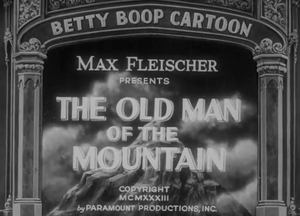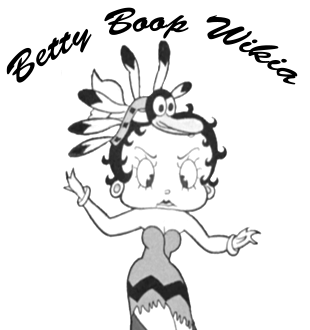The Old Man of the Mountain
| Betty Boop in The Old Man of the Mountain |
|---|
| The Old Man of the Mountain | |
|---|---|
 | |
|
Name |
The Old Man of the Mountain |
 | |
|
Name |
The Old Man of the Mountain (1933) |
The Old Man of the Mountain is a 1933 animated short in the Betty Boop series, produced by Fleischer Studios. Featuring special guests Cab Calloway and His Orchestra, the short was originally released to theaters on August 4, 1933 by Paramount Productions.
Calloway voices all of the characters in the cartoon save for Betty herself (talking voice provided by Bonnie Poe; singing voice provided by Mae Questel). Calloway, along with his orchestra, also perform all of the music in the cartoon, including two songs Calloway co-wrote.
The villagers are scared of the terror who lives in the heights until Betty Boop arrives with an air of indifference to the local bogeyman whom she is soon to entice to his just deserts.
Quotes
- Betty Boop: "I'm going up to see that old man of the mountain!"
Characters
- Betty Boop
- Old Man of the Mountain
- Owl
- Hippo
- The Old Man of the Mountain's Children
Cast & Crew
- Bonnie Poe as Betty Boop (Speaking voice)
- Mae Questel as Betty Boop (Singing voice)
- Cab Calloway as The Old Man of the Mountain
- Bonnie Poe as Hippo
- Max Fleischer (Producer)
- Dave Fleischer (Director)
- Bernard Wolf (Animator)
- Thomas Johnson (Animator)
Gallery
Trivia
- Was released on the 4th of August in 1933.
- Betty Boop's speaking voice seems to be provided by Bonnie Poe, whereas her singing voice is provided by Mae Questel together with Cab Calloway, which means that the song "You Got To Hi-De-Hi" was pre-recorded before or after the voice-acting, and or both Questel and Poe did separate recordings for this cartoon.
- The Old Man of the Mountain was the third and last of the Fleischer cartoons pairing Betty Boop and Cab Calloway, The two others are Minnie the Moocher and Snow White.
- The dialogue between Betty and the Old Man ("Whatcha gonna do now? Gonna do the best I can!") is mirrored almost exactly in a scene between Santa Claus and Oogie Boogie in the 1993 film The Nightmare Before Christmas. The scene also features music very similar to Calloway's "Minnie the Moocher" and dance steps close to Calloway's own.
- According to film historian Christopher Lehman, the sexually suggestive nature of this film caused "some Americans at the time, especially Catholics," to complain to exhibitors who then pressured Paramount Studios (distributor of the Betty Boop series) to tone down the Betty Boop character, which subsequently pressured Fleischer Studios to do the same. According to Lehman, "In dispensing with the African-American entertainers and their music after limiting the 'Betty Boop' series' sexual references, Max Fleischer thus acknowledged the widely assumed connection between raciness and blackness." After 1934, African-American jazz music would no longer appear in Betty Boop cartoons, and she transformed into a more conservative, mature, domestic character who often played only a supporting role.
- This cartoon slightly inspired the Aviary Action background in Cuphead the video game.












